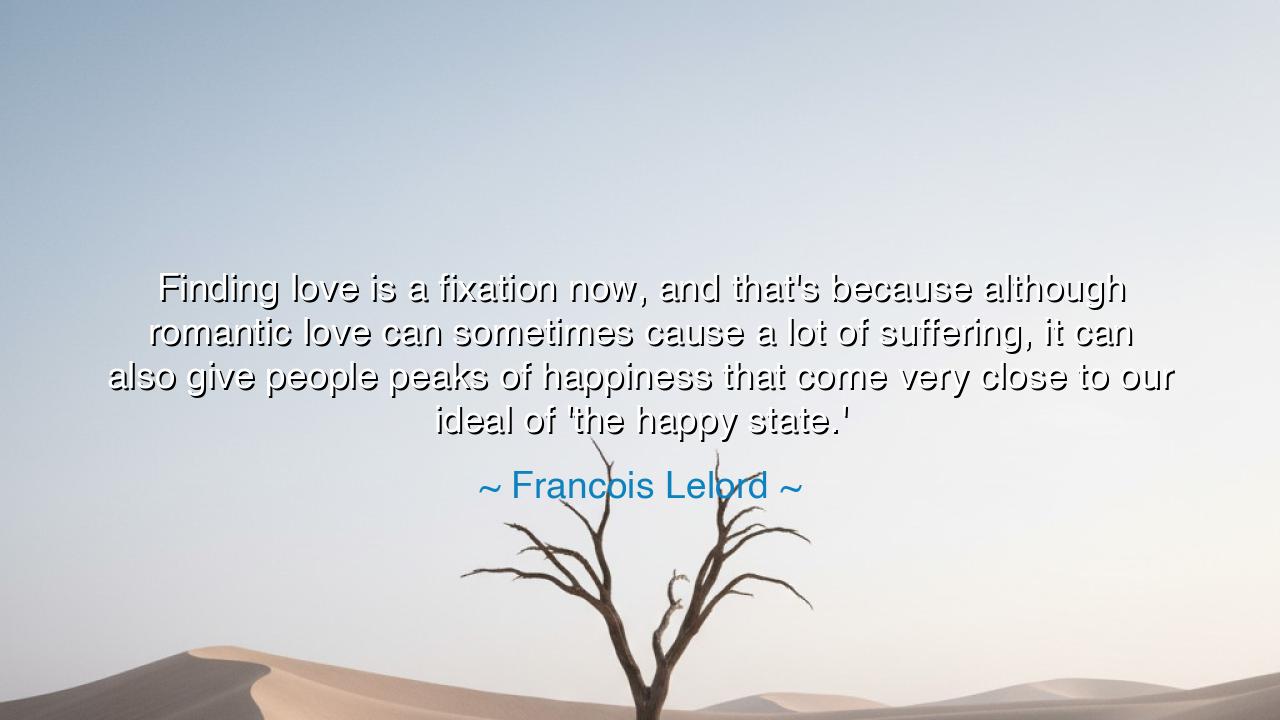
Finding love is a fixation now, and that's because although
Finding love is a fixation now, and that's because although romantic love can sometimes cause a lot of suffering, it can also give people peaks of happiness that come very close to our ideal of 'the happy state.'






"Finding love is a fixation now, and that's because although romantic love can sometimes cause a lot of suffering, it can also give people peaks of happiness that come very close to our ideal of 'the happy state.'" These words from Francois Lelord touch upon a profound truth about the nature of romantic love in the human experience. It is a force that can elevate the soul to heights of joy, yet also bring the heart to depths of sorrow. Lelord reflects on the fixation with love that has become a central theme in modern life, an obsession that fuels our dreams, desires, and expectations. In this fixation, we chase after a kind of perfect happiness, often equating it with the romantic love that promises fleeting moments of bliss.
In the ancient world, love was seen as a powerful force, both divine and destructive. The Greek god Eros, whose very name evokes the essence of romantic love, was revered not only for the beauty and joy his arrows brought but also for the chaos they caused. Plato, in his Symposium, spoke of love as a pursuit of beauty and truth, but also acknowledged the suffering that love could bring when unattainable or unrequited. Eros was not simply the source of joy, but of tension, the force that drove people to seek connection, but also the very thing that could tear them apart. Thus, romantic love, for the ancients, was a double-edged sword—its pursuit was a path that led not only to moments of bliss but to inevitable pain.
Even in the Epic of Gilgamesh, one of the oldest known stories, we see how the longing for companionship and connection leads both to joy and suffering. Gilgamesh seeks eternal life, but in doing so, he is driven by the desire for companionship, a deep yearning to understand love and friendship. The bond he shares with Enkidu brings him immense joy, but also immense grief when Enkidu dies. This story reveals that love—whether romantic or platonic—is inherently tied to the human condition. The peaks of happiness it can bring are always tempered by the valleys of loss and sorrow that often follow.
Lelord’s observation that romantic love provides moments of happiness close to our ideal of the "happy state" speaks to the deeply human longing for fulfillment and wholeness. Love offers glimpses of what many consider to be the ideal state of happiness—a unity with another person, a connection so profound that it seems to make the world complete. However, the impermanence of these moments—the very fleeting nature of romantic passion—also underscores a central truth: that happiness, as we idealize it, is often temporary. The joy found in love is intense, but it is often marked by contradiction—it can cause suffering as much as it causes joy.
Take, for example, the story of Helen of Troy, whose beauty and the love she inspired were the catalysts for the Trojan War. Her romantic love with Paris is a symbol of the heights of happiness and connection, yet it brings untold suffering to those around her and to herself. Helen’s love, and the war it ignites, shows the duality of romantic love—how it can be the source of intense joy yet also of devastating consequences. Helen, like many figures in mythology, embodies the paradox of romantic love: it is both heavenly and hellish, a pursuit that elevates us but often comes with a cost.
In our own lives, romantic love often occupies the same place as it did in the minds of ancient thinkers. We seek love because it promises the heights of happiness, yet we know that it also carries the potential for suffering. It is this contrast that makes love so compelling—its intensity offers us moments of ecstasy, while its inevitable loss brings us grief. The lesson from Lelord, then, is not to shy away from love but to accept both its joys and sorrows as part of the human journey. To love is to embrace vulnerability, to risk the pain of loss for the beauty of connection.
The practical lesson here is clear: we must embrace the complexity of love and happiness. In our search for love, we should not be blinded by the idealized vision of a perfect, unwavering happiness but should accept the transience of such moments. Love brings joy, but it also brings the potential for pain, and in this, we find the fullness of life. Like the ancients, we must understand that the path of romantic love is both enlightening and arduous, a journey filled with both pleasure and heartache. In the end, it is not the permanence of love that defines it, but the depth of the connection we form and the courage to love deeply, fully, and without expectation of eternal happiness.






AAdministratorAdministrator
Welcome, honored guests. Please leave a comment, we will respond soon